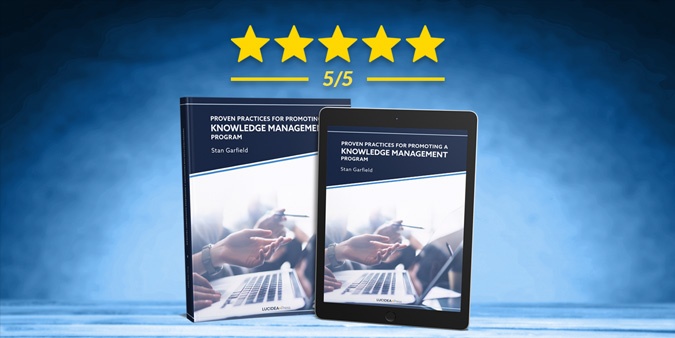The biggest mistake people make when selecting a KM system is to choose a platform instead of an application. The business case is dazzlingly simple—yet many organizations overlook it.
We've Moved!
Think Clearly has a new home! Click here to see our latest posts.
*If there’s older content you’d like to catch up on, you can browse right where you are, until Friday, April 5th.
We know it takes a minute to get used to change!
Ron Aspe, CEO
Recent Posts
Artificial Intelligence (AI) – An Important Tool for Special Librarians
It used to be that everything a special library’s clients needed to know was available ‘in the stacks’—and it was therefore a reasonable assumption that if it was shelved, it should be easily retrievable. Today’s flood of digital content makes it difficult for many libraries to meet the ‘all access’ expectation.
Topics: Artificial Intelligence, Technology, Special Librarianship
If you are ever at a dinner party and want to kill a conversation, tell the people you’re sitting with that you are into knowledge management. They won’t exactly move their chairs away, but they’ll suddenly be more interested in the food they’re eating. AI, however, is something many people have an opinion about—and it could just be the big break that KM needs.
Topics: Knowledge Management, Artificial Intelligence, KM
When planning an integrated library system (ILS) implementation, you should remember that software applications are not like houses: it costs a lot more to build an application from scratch than to buy a new one. But why is that?
Topics: Integrated Library Systems, ILS, Special Librarians, Open source
I can’t lose if I begin this post with a quote from Aristotle: “The whole is greater than the sum of its parts.” I actually do think of this when I consider the impact of integration. With regard to knowledge management applications, KM solutions should not dictate the way people work and how they do things, but rather should dock neatly with existing systems and processes in order to optimize organizational knowledge delivery and exchange.
Topics: Knowledge Management, Special Libraries, KM, Strategy
Pilots can’t fly unless they have instruments that tell them what the plane is doing at all times, and where it’s heading. Library professionals need instruments too, in order to assess whether the products and services they are providing are valued, and to understand what additional products and services might be needed. Read about 4 tools that will help you maintain your situational awareness.
Topics: Management, Special Libraries, Strategy
We’ve all suffered through slick, packaged PowerPoint presentations that offer few glimpses of the actual software product. Seldom do we really get to see what we’re interested in. Here is a fool proof strategy to get potential vendors to actually show you how their products can help you achieve your goals.
Topics: Library Management, ILS, Library Automation Software
In his Adweek article, Millennials are Discovering Art by Ditching Museums for Instagram and Pinterest, Robert Klara asserts that “social media has nudged museums aside as the primary venue by which American consumers discover works of art.” Don’t let your museum be nudged aside!
Topics: Museums, Social Media, Collections Management Software, Museum Collections Management Software
How (and Why) My Favorite Brick and Mortar Bookstore Continues to Thrive
Frequent travelers through San Francisco’s airport who love to read have probably stopped in at Compass Books in Terminal 3. The quality and range of their selection always impresses me, as do the knowledgeable staff. Recently, when SFO underwent significant renovations, I feared the store had closed—another victim of the digital age.
Topics: Library Management, Information Management, Management, Marketing, User Engagement
There will, no doubt, be certain jobs and industries that will be dramatically impacted by artificial intelligence (AI). However, that can be said about virtually any technological innovation introduced in the past 30 years. A more interesting question might be, “How does the hype surrounding AI affect my career today?”
Topics: Library Management, Knowledge Management, Knowledge Management Systems, Integrated Library Systems, Museum Collections Management Software, Artificial Intelligence, Archives
How to Break the Gravitational Pull of Legacy Software Applications
We have all been there, and I’ve been there a lot. In the not too distant past, I was required to use an IBM mainframe to do my “word processing” when PC based solutions had far better functionality. Later, I was required to use email software that wasn’t compatible with the internet. The list goes on, and the problem still exists. There is hope: please read on for some ideas on how to break away from legacy software.
Topics: Library Management, Knowledge Management, Knowledge Management Systems, Integrated Library Systems
5 out of 5 Stars for a “rich and practical source of proven KM programs and practices”
Jean-Claude Monney, Chief Knowledge Officer, Microsoft Enterprise Services, recently awarded five stars to Stan Garfield’s new book titled Proven Practices for Promoting a Knowledge Management Program. This comprehensive text, published by Lucidea Press, is an actionable guide to promoting knowledge management practices within your organization. If you want your KM program to achieve maximum success, you simply must read this book.
Topics: Knowledge Management, Proven Practices
The biggest mistake people make when selecting a KM system is to choose a platform instead of an application. The business case is dazzlingly simple—yet many organizations overlook it.
Topics: Knowledge Management, Inmagic Presto, Knowledge Management Systems
Open source software (OSS) is the technology world’s response to consumers who are price sensitive, but as with many things, it’s important to do your homework before making a commitment. Read on for some thought provoking suggestions on how to evaluate the best ILS or KM software for your organization. Maybe it’s open source, maybe it isn’t.
Topics: Library Management, Knowledge Management, Archives Collections Management Software, Knowledge Management Systems, Collections Management Software, Integrated Library Systems
Pilots can’t fly unless they have instruments that tell them what the plane is doing at all times, and where it’s heading. KM professionals need instruments too, in order to assess whether the products and services they are providing are valued, and to understand what additional products and services might be needed.
Topics: Knowledge Management, Electronic Resource Management, Knowledge Management Systems, LookUp Precision
Do You Deliver Content via Your Organization’s Website? Upward Mobility is Key!
As part of its new mobile-first strategy, Google will give preferential search rankings to mobile-friendly sites (sites optimized for mobile devices). This change will have a significant impact on search results. Librarians and knowledge managers who make content available to the public, external researchers, funders, et al., through an organizational website must take this into consideration.
Topics: Library Management, Knowledge Management, Solo Librarianship, SydneyEnterprise, Inmagic Presto, Knowledge Management Systems, Integrated Library Systems, GeniePlus
Could you lose your job to a robot? In an earlier post, I wrote about 10 Ways to Foil a Robot, which I hope was inspiring and optimistic. In reality, artificial intelligence is yet another tool for knowledge professionals—an arrow in the quiver.
Topics: Library Management, Solo Librarianship, Integrated Library Systems, Artificial Intelligence
Google’s Mobile-First Indexing Strategy is Critical to Your Organization’s Web Presence
Does your organization’s mobile website lack the punch of your desktop version?
“Today, most people are searching on Google using a mobile device. However, our ranking systems still typically look at the desktop version of a page’s content to evaluate its relevance to the user. This can cause issues when the mobile page has less content than the desktop page because our algorithms are not evaluating the actual page that is seen by a mobile searcher.”
–Google Webmaster Central Blog, Mobile-first Indexing, November 4th, 2016
As part of its new mobile-first strategy, Google will give preferential search rankings to “mobile-friendly" sites (sites optimized for mobile devices). This change will have a significant impact on search results.
Topics: Library Management, Knowledge Management, Collections Management Software, Strategy, Archives



















